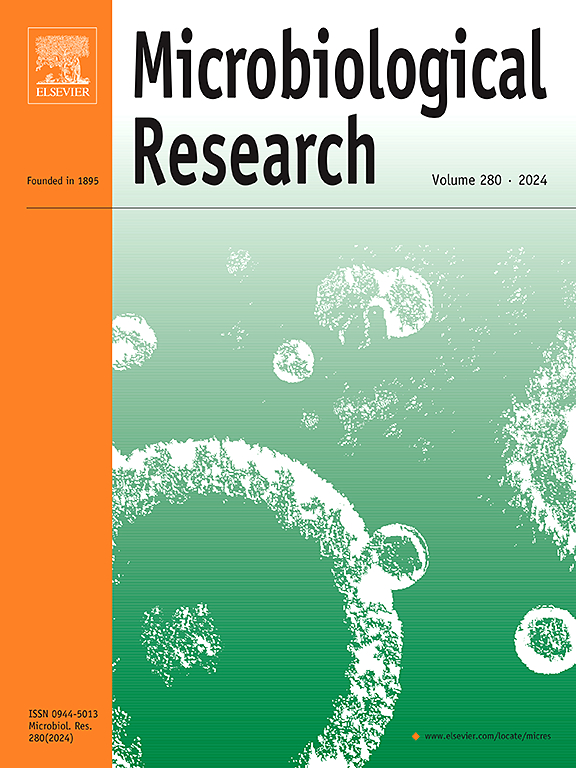Gut microbiota-driven BCAA biosynthesis via Staphylococcus aureus -expressed acetolactate synthase impairs glycemic control in type 2 diabetes in South China
IF 6.9
1区 生物学
Q1 MICROBIOLOGY
引用次数: 0
Abstract
An increase in branched-chain amino acid (BCAA) levels can result in insulin resistance at different stages of type 2 diabetes (T2D), however, the causes of this increase are unclear. We performed metagenomics and metabolomics profiling in patients with prediabetes (PDM), newly diagnosed diabetes (NDDM), and post-medication type 2 diabetes (P2DM) to investigate whether altered gut microbes and metabolites could explain the specific clinical characteristics of different disease stages of T2D. Here we identify acetolactate synthase (ALS) a BCAA biosynthesis enzyme in Staphylococcus aureus as a cause of T2D insulin resistance. Compared with healthy peoples, patients with PDM, NDDM, and P2DM groups, especially in P2DM group, have increased faecal numbers of S. aureus. We also demonstrated that insulin administration may be a risk factor for S. aureus infection in T2D. The presence of ALS-positive S. aureus correlated with the levels of BCAAs and was associated with an increased fasting blood glucose (FBG) and insulin resistance. Humanized microbiota transplantation experiment indicated that ALS contributes to disordered insulin resistance mediated by S. aureus. We also found that S. aureus phage can reduced the FBG levels and insulin resistance in db/db mice. The ALS-positive S. aureus are associated with insulin resistance in T2D, opening a new therapeutic avenue for the prevention or treatment of diabetes.
通过金黄色葡萄球菌表达的乙酰乳酸合成酶,肠道微生物驱动的BCAA生物合成损害了中国南方2型糖尿病患者的血糖控制
支链氨基酸(BCAA)水平的增加可导致2型糖尿病(T2D)不同阶段的胰岛素抵抗,然而,这种增加的原因尚不清楚。我们对糖尿病前期(PDM)、新诊断糖尿病(NDDM)和服药后2型糖尿病(P2DM)患者进行宏基因组学和代谢组学分析,以研究肠道微生物和代谢物的改变是否可以解释T2D不同疾病阶段的具体临床特征。在这里,我们发现乙酰乳酸合成酶(ALS)是一种BCAA生物合成酶,在金黄色葡萄球菌中作为T2D胰岛素抵抗的一个原因。与健康人群相比,PDM、NDDM和P2DM组患者,特别是P2DM组患者粪便中金黄色葡萄球菌数量增加。我们也证明胰岛素给药可能是t2dm金黄色葡萄球菌感染的一个危险因素。als阳性金黄色葡萄球菌的存在与BCAAs水平相关,并与空腹血糖(FBG)升高和胰岛素抵抗相关。人源菌群移植实验表明,ALS与金黄色葡萄球菌介导的胰岛素抵抗紊乱有关。我们还发现金黄色葡萄球菌噬菌体可以降低db/db小鼠的FBG水平和胰岛素抵抗。als阳性金黄色葡萄球菌与t2dm患者胰岛素抵抗相关,为糖尿病的预防或治疗开辟了新的治疗途径。
本文章由计算机程序翻译,如有差异,请以英文原文为准。
求助全文
约1分钟内获得全文
求助全文
来源期刊

Microbiological research
生物-微生物学
CiteScore
10.90
自引率
6.00%
发文量
249
审稿时长
29 days
期刊介绍:
Microbiological Research is devoted to publishing reports on prokaryotic and eukaryotic microorganisms such as yeasts, fungi, bacteria, archaea, and protozoa. Research on interactions between pathogenic microorganisms and their environment or hosts are also covered.
 求助内容:
求助内容: 应助结果提醒方式:
应助结果提醒方式:


